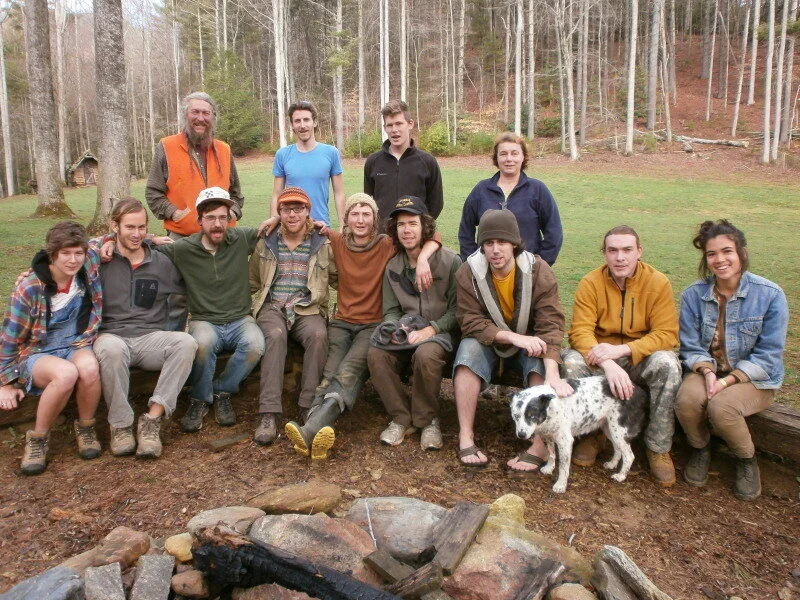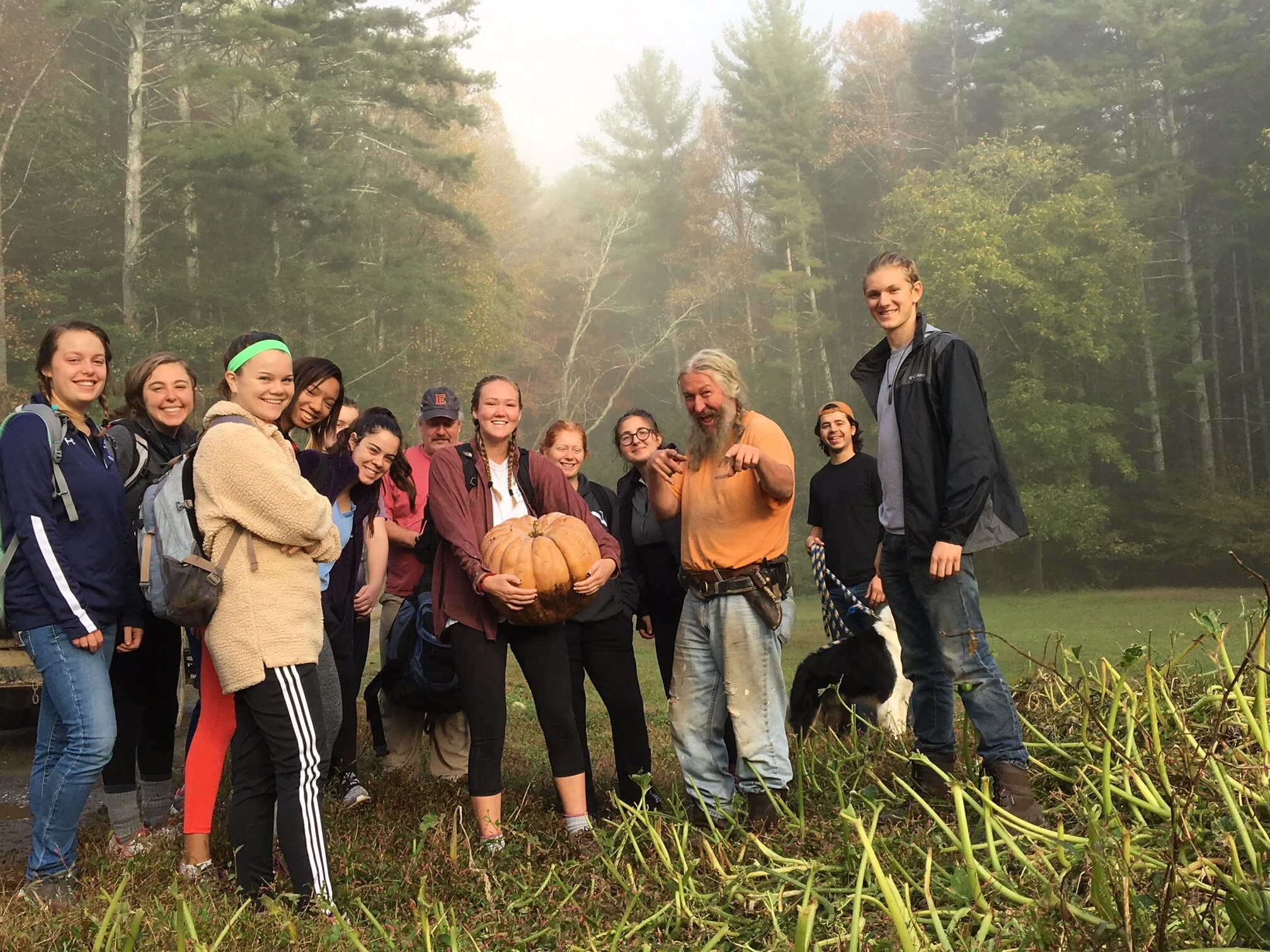
College Programs
Discovery Visits
Day-Long and overnight visits are available to college and university groups. We have countless hands-on lessons and classes offered in Homesteading, Appalachian Lore, Permaculture, Off-Grid Living, Forest Management, Alternative Energy Sources and MUCH more! For students reading "The Last American Man" by Elizabeth Gilbert - a trip to Turtle Island is a great way to see and expereince first hand the life-work of Eustace Conway and possibly even meet him in person! Send an email to: carolyn@turtleislandpreserve.com for more info.
Service Learning / Alternative Breaks
Alternative Fall and Spring Break Service Trips are available to college and university groups all throughout the United States and beyond! Because the focus of these trips is teamwork and contributing physical effort, the pricing is 50% off our normal college group rate. A minimum of 12 total participants is required. (no maximum).
Service trip students spend their time here helping out with the many needs of our Spartan lifestyle. The workday begins early.. Our daily projects involve physical labor and a rapid work-pace. We work outside. We may break up into smaller groups, or all work on lager projects. Preparing firewood, clearing & maintaining trails, and food prep, are just a few of the many things we have done with past groups. We are eager to work with groups that are willing and able to take on new challenges and maintain a positive attitude.
Alternative break students need to be prepared to work hard by day and gather around the fire by night. We have countless projects that we need help with. We are grateful for the many students who have helped create and maintain this extraordinary outdoor education center. Continue reading to prepare for your own visit and learn more about what to expect from a service trip.
Many people find that Turtle Island alerts the senses. Opportunities to learn at Turtle Island are abundant. Mostly you will learn by doing. Listening, paying attention, working hard, following directions, being efficient, and working together as a team - are all highly valued skills that we hold as essential at Turtle Island Work Camp.
Living Quarters:
Students camp outside as a group in an Adirondack-style cabin/shelter. Fall asleep listening to the rushing waters of the streams and feel the breeze on your cheeks. Review the "What to Bring" list - its a great guide for your comfort and needs in your home away from home.
Kitchen:
Meals are announced by the blowing of a large conch shell, and eaten community-style in our outdoor kitchen. Our delicious and nutritious food is exclusively cooked over wood fire and our water is heated the same way. You might have the chance to pick food from our gardens, or interact with our dairy goat operations. We are actively engaged in acquiring and growing our own food. We consider it sacred. Our delicious water comes from deep inside our mountain well. Please keep your water bottle full of it, and drink often. Staying hydrated is very important. There are designated water fill-up stations in camp. We DO NOT drink water directly from the streams - ever.
Bathroom:
We have two types of outhouses at the Preserve, sitting & squatting. You can choose where to go. You may also notice an outhouse with a sawdust bucket. Most humans pass about 7 lbs of nitrogen through urine each year, and nitrogen really helps crops grow. We collect the urine in the sawdust buckets and then add that to our compost heap. Our outhouses are stocked with toilet paper and receptacles for feminine needs.
Cleanliness:
Keeping clean helps us stay comfortable and safe. We will demonstrate proper personal bathing and oral hygiene techniques and designate an area in your camp to carry out such activities. A messy floor leads to nasty tripping hazards in the night and edible materials in cabins attract wild animals from the forest. Keeping your sleeping area neat and rolled up each morning will keep your bed dry and cozy. Do not litter! We will also make sure that everyone has the opportunity and skills to practice good hygiene without having a negative impact on the forest. Each meal is preceded by a thorough hand washing with soap and water. There are hand-washing stations at the barn, by the outhouses and just outside the kitchen. Use them as often as needed.
What To Bring:
This WHAT TO BRING LIST specifies the exact items to bring and which to leave at home. Here are a few more details…You’ll be outside, traveling around the preserve throughout the day. A daypack (light bookbag) is essential for you to carry your water bottle, camera, extra layer, work-gloves… that kind of stuff. Keep in mind, it is far better to be too hot than too cold. Make sure your clothes are sturdy and warm. At night you’ll be in the dark so a flashlight/lantern and a really warm bed are also crucial. You might want to bring a game, musical instrument or stories to share around the fire… think “outside” the box. Heck, just think OUTSIDE!
Danger:
Imagine that the forest is a friend you can get to know – a good, peaceful place. There are some dangers like snakes, poison ivy, yellow jackets, etc. but our staff will teach you how to learn about and deal with them. Leaving them alone and backing away if you encounter them are a good first measure. Ignorance and fear are the most dangerous things humans encounter. We’d like to empower you and teach you how to be safe. Fire and sharp tools are examples of dangerous things we rely on here. With respect and caution you will be able to learn these things and stay out of harm’s way.
Safety:
Do not approach an animal without direction of the TIP staff. Remember to carry your small flashlight, raincoat & water bottle in your day pack at all times. Rainshowers show up out of nowhere around here (this region is a temperate rainforest by definition), so its good to be prepared. Keeping dry is crucial, not only for comfort but for safety from problems such as hypothermia. Keep shoes and clothes dry, if they do get wet, hang them in a warm, dry place and put dry clothes on. Also, on our big projects, teamwork and good communication are crucial to keep everyone safe. You will learn plenty of hard skills, but the soft skills like: communication, trust and respect can and will be honed while visiting and working here.
Appropriate Behavior:
Trust and Respect are absolutely necessary for all participants in camp at all times. Be kind and sensitive to others needs. Do not try to scare anyone, or react negatively to a new experience. Be polite. It is very different to be outside without walls and personal space. You must learn to understand the “tribal community” – ideas our Indian ancestors knew well.
To learn more about our site and programs please explore our listing on http://alternativebreaks.org/ or by reviewing the SITE INFO document.
We look forward to hosting your visit!



